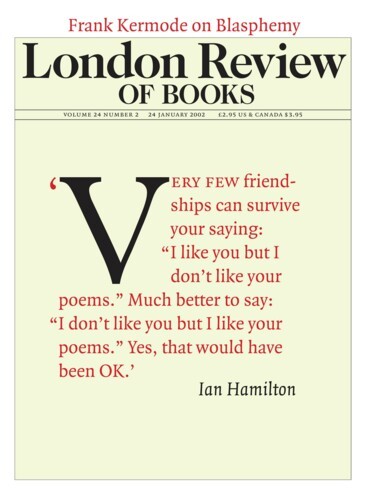There’s no question but that the Paris imprint which has for many years past brought out the likeliest new books, novels especially, is the Editions de Minuit. They’ve managed it by being hard to please editorially (as few publishers any longer are in an age of inexplicable hospitality to authorship), the Minuit never having looked to go beyond twenty books a year. And they’ve managed it by having someone in charge who never meant to let other people come between him and the writers he chose to publish; someone who ran the whole thing exactly as he wanted, down, literally, to the intrusion of commas into such sentences as he thought showed a need of them. This was Jérôme Lindon, who took over the firm in 1948 and ran it for 53 years up until his death in April last year.
It had begun during the Occupation, with the midnight of the name serving as a clue to its having come into being under a German curfew. Its first book, written by one of the two founders, Jean Bruller, under the pseudonym of Vercors, was Le Silence de la mer, the story of an elderly Frenchman and his niece, who refuse ever to speak to the German officer who is billeted on them: rightly the most celebrated piece of writing to have come out of the Resistance. The book’s great success didn’t long outlast the war, however, and by the time Lindon took it over, the Minuit was close to extinction. He had himself done exceptionally well as an adolescent member of the Resistance, and during the 1950s he did exceptionally well for a second time, by publishing books that drew attention to what the French Army was being encouraged to do in colonial Algeria – notably La Question, a book which made public for the first time the systematic torture practised on nationalist suspects. Lindon was constantly at odds with the authorities and the courts, but he gave no ground. He became quickly, and unusually for a publisher, a moral force in the country.
And he quickly became a literary force, too. He was the first French publisher to think Samuel Beckett had possibilities, once Beckett began writing in French, and then, in the late 1950s, he took on the authors who together became known for a time as the Ecole de Minuit, before entering literary history as the Nouveaux Romanciers: Alain Robbe-Grillet, Claude Simon, Nathalie Sarraute, Michel Butor and the hugely entertaining and wrongly overlooked Robert Pinget. Beckett in particular, and later the very bankable Robbe-Grillet and Simon, seem never to have thought of being published by anyone else, even if it did mean their having to argue the toss over punctuation. There could be no more pleasant way of understanding why they should have stuck so happily to a small publisher, without the money – or the least wish – to go in for publicity of any splashy sort, than to read the short, thoroughly engaging account of his own dealings with Lindon written by another of Minuit’s great successes, the novelist Jean Echenoz, whose unlikely capture of the Prix Goncourt a year or two ago restored a bit of substance to that hollow award.*
Echenoz is well known for his diffidence, and for a long time after he began publishing with Minuit, in 1979, found Lindon alarming – ‘l’essence de la vertu littéraire’. Lindon didn’t hang around. Having decided he liked Echenoz’s first, many times rejected manuscript, he had the contract drawn up and signed within an hour of their first meeting in his office, a document whose reality the novelist found hard to credit but which he protected on the journey home to the suburbs by buying a shirt he couldn’t afford for the sake of its stiff cardboard wrapping. Lindon remained rather alarming, with scant liking for small talk – except for the Jewish jokes he told and retold – and above all for being confided in or consulted over anything extra-textual. And when he didn’t like a manuscript he said so more roundly than a nervous author wanted, at one point telling Echenoz: ‘Vous ne faites plus partie des Editions de Minuit.’ Echenoz, however, was eventually back for more, knowing he was never going to find a more committed, intelligent and incorrigibly frank publisher.
His book is a rarity: as honest an account of the commerce between author and publisher as one could wish for. It’s an account of how Echenoz was slowly won over, not by any efforts made in that direction by Lindon, who had no such capability, but by his own gathering sense of how fortunate he’d been to fall in with such a man, one who could be disturbingly abrupt and dictatorial, only later to reveal how surprised he was to have got away with it. He had earned himself just the kind of wry and understated tribute Echenoz has now paid him. Particularly striking about it, read at this end of the Tunnel, is that no literary agent ever came between the two of them. Echenoz seems to have met his publisher face to face times without number over the years, without any suggestion that a hired intermediary would be a good idea. More strikingly still, Lindon never oversold the books he published, least of all to their authors: he was often pessimistic to their face about their chances in the shops.
It’s hard to imagine that other writers in France or anywhere else have it in mind to do for their publisher what Echenoz has done for his; for the good and regrettable reason that their publishers aren’t at all the sort of people Jérôme Lindon was.
Send Letters To:
The Editor
London Review of Books,
28 Little Russell Street
London, WC1A 2HN
letters@lrb.co.uk
Please include name, address, and a telephone number.

